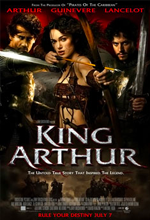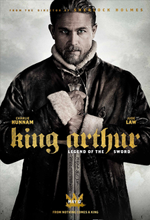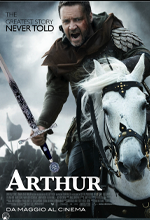This is the second draft. No changes were made after February 3rd, 2022.
Hi, I'm Alex Daily.
Let me tell you a story.
You'll have heard it before.

So there's this kid, right. Scrawny little boy. Lives in England, or Wales, maybe.
Kid gets raised in the countryside by his uncle. One day, the kid pulls a sword from a stone. Ridiculous. It was stuck in there for ages. Even before it rusted all to hell, it wasn't a particularly good sword.
Turns out pulling the sword from the stone makes you king of England. Or Wales. (You know what, let's just call it Britain.)
This is, of course, a ridiculous way of determining anything about your government, even a British one. It must have been the style at the time.
Kid goes on to be a pretty good king. Has a French friend, a wizard friend, a girlfriend. Has some meetings around a famous table. Dies in a field. You know how it goes. Like I said, you've heard it before.
Because that's the story of King Arthur.

Here's the thing about the story of King Arthur.
It's pretty obvious none of it is true.
The story of King Arthur is rooted in the oral tradition of the late Early Middle Ages. (The Early Middle Ages are a real, distinct period of history that there can in fact be a late stage of, though it does sound a bit silly.) Stories told around campfires, and in songs sung by traveling tale-spinners.
If a historical King Arthur existed at all, the similarities to the likeliest candidates begin and end at, was a ruler, had a similar sounding name, died.
Prominent characters like Lancelot and Gawain likely originate in folk tales that were originally independent, fused to the stories of King Arthur at the whims of storytellers oral, literary, or otherwise.
So what's my point here? Let me show you something.
These are the five mainstream movies released between 2000 and 2021 that are directly based on the story of King Arthur.





Now, these are the three of those five movies that claim to be telling, in some way, the true story of King Arthur, the reality behind the myth, the truth.



But how can there be a true story?
The story of King Arthur was cobbled together over several centuries, by writers from all over Britain and France, the earliest forms of which most of us wouldn't recognise as Arthurian. Any reality of it has the same problem, and is largely considered lost to history.
The... truth is... Truth is so subjective. The story of King Arthur, if it's true at all, dates back circa 1500 years, with what we consider canonical really evolving quite a lot over the centuries. Most modern depictions don't even get the style of the armour the knights wear right.
Does this happen with all stories? With all history? A thousand years from now, will they be making holo-movies about the current pandemic where we all wear giant ruffled millstone collars? 16th century, 2022, that's close enough, right?
How will history remember you? Or, more importantly, how will history remember me? Will it? What if it doesn't? What if... I could make it-- Okay, hold on, that sounds more villainous than I meant it to.
...
What if I could... write myself into history? I don't know the future, so there's no way to know how history-to-come will remember me-who-was-here. But what about the history-that-has-been? Is there a place in there for me to say... this is where I might have fit in, if I'd been there? If I'd existed...
In part two. The Totally True Story of Alex Daily.